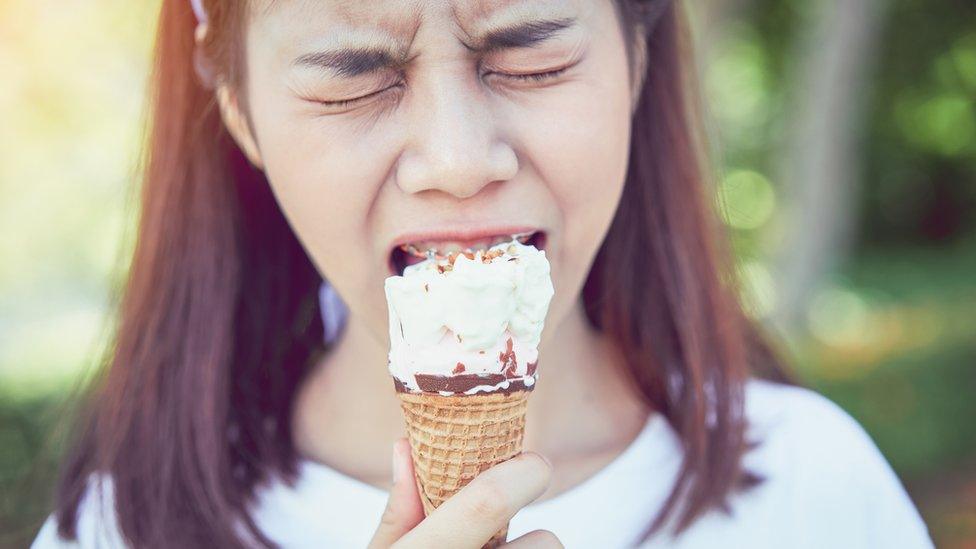'Ice-cream toothache': Cold food and drinks pain explained
- Published

Scientists believe they have worked out why biting down on ice or drinking something really cold causes excruciating pain for some people.
They have located the cells and signals in sensitive teeth that detect big temperature drops and trigger toothache and brain jolt.
People with dental decay are prone to it because the pathway is exposed.
It provides a target for new treatments, such as toothpastes, dental patches or chewing gum, they say.
Prof Katharina Zimmermann is lead investigator of the work, published in the journal .
"Once you have a molecule to target, there is a possibility of treatment," she explained.
The target is called TRPC5, and Prof Zimmermann's team at the Friedrich-Alexander University Erlangen-N眉rnberg in Germany traced its location to a specific cell type - the odontoblast - that resides between the soft inner pulp and the hard outer layer of teeth composed of dentine, then enamel.
The odontoblasts in this mouse tooth are coloured bright green on this scan
Enamel has no feeling, unlike the next layer dentine. The dentine connects to the innermost pulp, where nerve cells live.
If the dentine becomes exposed, following tooth decay or gum disease for example, painful stimuli such as temperature or certain liquids will cause pain.
The researchers studied mice and humans to understand how the pain arises, recording what was happening in cells and nerves.
Dr Zimmermann told the 大象传媒: "In human teeth with pits and dental caries we found a much upregulated number of TRPC5 channels, and therefore we believe that engineering a TRPC5 blocker that can be locally applied to teeth via strips or chewing gum would probably be a great help in treating tooth pain or dentine hypersensitivity."
One common home remedy - clove oil - contains a chemical called eugenol that blocks this TRPC5 pathway.
The scientists are not recommending DIY treatments though. People who are experiencing any worrying toothache should still see a dentist, they stress.
Prof Damien Walmsley from the British Dental Association (BDA) said blocking the pain might provide temporary relief, but it was vital to treat and prevent the cause. Brushing regularly could stop tooth and gum disease, he advised.
"The research is interesting but we can't ignore the underlying causes of tooth sensitivity, nor people's perception of pain. Dentists can treat the cause by removing the tooth decay, and advise on toothpaste for sensitive teeth."
He said that in the future, TRPC5 blocking agents might be included in toothpastes and dental products to prevent the pain of sensitivity.
Prof Zimmermann's team did not receive any commercial financing for the work. It was funded by the German Research Foundation and the Howard Hughes Medical Institute in the US.
Tooth decay happens when the enamel and dentine of a tooth become softened by acid attacks after eating or drinking anything containing sugars, says the BDA.
Over time, the acid makes a cavity (hole) in the tooth.
Your risk of tooth decay is increased by how often you have sugary or acidic foods or drinks, so it is best to limit them to mealtimes.